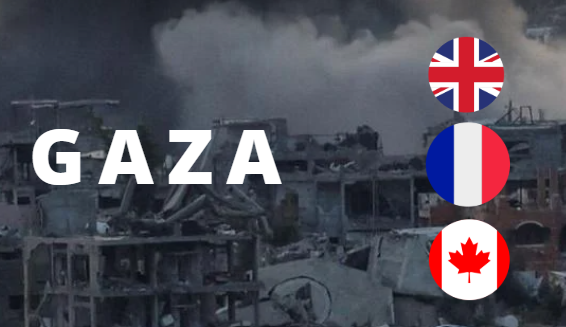As Israel intensifies its military offensive in Gaza under the “Gideon’s Chariots” operation, the international backlash has escalated sharply. The United Kingdom, France, and Canada have jointly warned Israel of impending sanctions unless it halts the renewed ground offensive and lifts its prolonged blockade on humanitarian aid to Gaza. This marks a significant diplomatic shift from Israel’s traditional allies, amid rising global condemnation over the humanitarian toll in Gaza.
Here’s a detailed breakdown of the current developments.
1. The Offensive: What Is Happening in Gaza Now?
On May 5, Israel’s Security Cabinet approved a new military campaign aimed at achieving “all war objectives,” including the total defeat of Hamas and securing the release of remaining hostages. Over the weekend, the Israeli military launched a full-scale ground invasion into both northern and southern Gaza, following intense airstrikes that began last week.
-
The Israel Defense Forces (IDF) claim to have struck over 670 Hamas targets in the last seven days.
-
At least 136 Palestinians were killed in a single day (May 19), according to the Gaza Health Ministry.
-
More than 400 deaths and 1,000 injuries have occurred since May 16.
-
The assault damaged key infrastructure, including the Nasser Medical Complex, a major hospital in Khan Younis, putting further strain on an already collapsed health system.
-
The last functioning hospital in northern Gaza has now ceased operations.
Since the war began on October 7, 2023, over 53,000 people have been killed in Gaza, with the majority being women and children, according to local health authorities.
2. International Pressure Mounts: Sanctions on the Table
In a coordinated move, the leaders of the UK, France, and Canada issued a joint warning on May 19:
“If Israel does not cease the renewed military offensive and lift its restrictions on humanitarian aid, we will take further concrete actions in response.”
These “concrete actions” include the potential imposition of targeted sanctions against individuals and entities responsible for continuing the military campaign and aid blockade. Such a step would mark an unprecedented departure from the long-standing Western support Israel has enjoyed.
Prime Minister Netanyahu responded by accusing the three nations of “rewarding terrorism” and undermining Israel’s security. However, analysts say the Israeli government is under growing diplomatic isolation, even from traditional allies like the United States, which has so far refrained from directly threatening sanctions.
3. Gaza’s Humanitarian Collapse: Famine, Blockades, and International Outcry
The humanitarian situation in Gaza is now dire:
-
Israel has blocked humanitarian aid for over 11 weeks, sparking warnings of imminent famine from the United Nations.
-
On Sunday, five aid trucks were allowed in—described by UN officials as “a drop in the ocean.”
-
UN agencies warn that all 2.1 million people in Gaza are at risk of starvation.
Despite Israel’s announcement that “a basic amount of food” will be allowed in, aid agencies, including UNICEF and the UN Office for the Coordination of Humanitarian Affairs, say this is insufficient and dangerously delayed.
Foreign ministers from 23 countries, including Germany and Italy, joined the UK, France, and Canada in demanding full and unhindered humanitarian access into Gaza and the immediate restoration of aid operations by UN agencies.
4. Controversial Aid Mechanism: Gaza Humanitarian Foundation (GHF)
In parallel, the Gaza Humanitarian Foundation (GHF)—a new American- and Israeli-backed organization—has been tasked with overseeing aid deliveries. However, the mechanism has drawn sharp criticism from humanitarian groups and UN officials.
-
Critics say the GHF militarizes aid, undermines the neutrality of humanitarian operations, and facilitates forced displacement from northern Gaza.
-
UNICEF’s Executive Director called the mechanism “unworkable” and a violation of humanitarian principles.
-
The UN insists existing aid systems are sufficient if allowed to function without obstruction.
Despite criticism, GHF’s director claims Israel has approved two aid distribution centers in northern Gaza, expected to become operational within 30 days.
5. U.S. Position: Pressure Without Sanctions
While President Donald Trump has publicly avoided direct condemnation of Israel, his administration is increasingly concerned about the optics of mass civilian suffering:
-
Trump acknowledged “people are starving in Gaza” but described the situation as a “logistical problem.”
-
During a recent visit to Gulf states, Trump emphasized that the U.S. wants an end to the war but has not proposed a clear path forward.
-
U.S. Special Envoy Steve Witkoff stated the key challenge is “dangerous conditions on the ground,” not policy disagreement.
Trump’s decision to exclude Israel from his latest regional tour, coupled with his suggestion that the U.S. could “take Gaza” and create a “freedom zone,” has only added confusion to Washington’s official stance.
6. Legal and Ethical Concerns: Genocide Warnings
The UN’s top humanitarian chief, Tom Fletcher, issued one of the strongest warnings yet, directly invoking the term “genocide.”
“Will you act decisively to prevent genocide? Or will you say instead, ‘we did all we could’?” Fletcher asked the UN Security Council.
Rights groups insist that as the occupying power, Israel bears legal responsibility for providing for Gaza’s civilian population. The destruction of medical infrastructure and blocking of aid could amount to violations of international humanitarian law.
A Turning Point in International Support
The threats of sanctions from close allies like the UK, France, and Canada signify a strategic shift in international patience with Israel’s war policy in Gaza. While Israel maintains that its military actions are necessary to defeat Hamas and secure hostages, the rising death toll, humanitarian collapse, and global outcry suggest that diplomatic isolation could deepen unless immediate changes occur.
The coming days will be crucial in determining whether Israel adjusts its approach under pressure or presses ahead, risking punitive measures and growing condemnation on the global stage.
Related story:
Netanyahu Announces Full-Scale Israeli Military Entry Into Gaza
Biden speaks with Israel’s Netanyahu, urges ‘immediate ceasefire’ in Gaza














